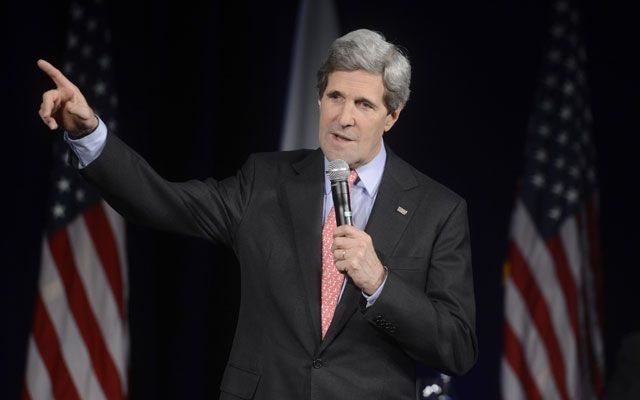Kerry: Diplomacy Is Hard Work
Helle Dale /
On Monday, Secretary of State John Kerry took off on his first foreign trip of the capitals of Western Europe and the Arab world. The focus of the trip is the just-about-impossible task of creating international consensus on ending the civil war in Syria at a an international conference in Rome on Thursday.
Kerry, who dearly coveted the State Department top job in the Obama Administration, must have experienced confusion once he moved from Capitol Hill to Foggy Bottom. In several speeches after taking office, Kerry has been bemoaning—some might say whining—about the complexity of the world we live in.
In a speech to U.S. embassy staff in London Monday, Kerry told the diplomats that they are not just representatives of the United States but “citizens of the world.” Kerry stated that his own experience as the son of a U.S. diplomat gave him a global perspective from a young age, as the family moved from posting to posting. “I feel like a citizen of the world,” he said.
In London, Kerry further stated that foreign policy is “much tougher” than it used to be.
All those forces that got tampered down by totalitarianism during the 20th century have all been unleashed. And now you see the sectarianism, the tribalism, and nationalism and these individual aspirations, and it’s tougher with a lot of young people all communicating to each other through the Internet and social media, all having these big aspirations and leaders that are fighting against modernity. That’s what’s going on.
The London speech comes on the heels of Kerry’s inaugural foreign policy address given at the University of Virginia last week. Though 6,500 words long, Kerry’s speech barely touched on actual U.S. foreign policy issues such as China, Iran, and Russia. Instead, Kerry identified sequestration and the budget deficit as the biggest threats to U.S. global leadership.
If everything is foreign policy, then nothing is foreign policy, and that is more or less where we are in the second term of the Obama Administration. Classic diplomacy, alliance building, and strategic planning based on national interest and values should be the cornerstones of U.S. foreign policy. Instead, we have a sprawling and increasingly unfocused State Department and a Secretary of State who thinks he is a citizen of the world.

